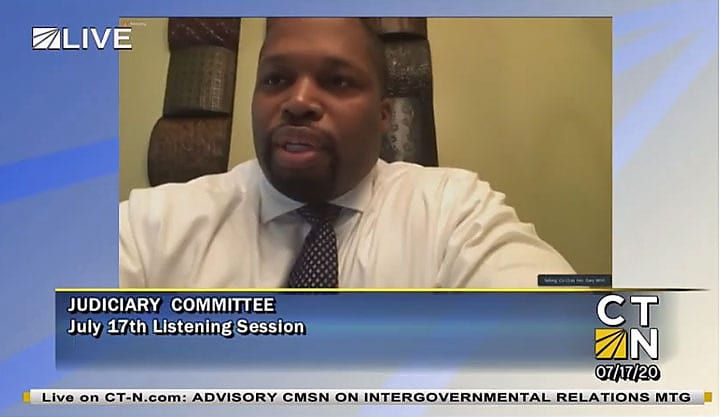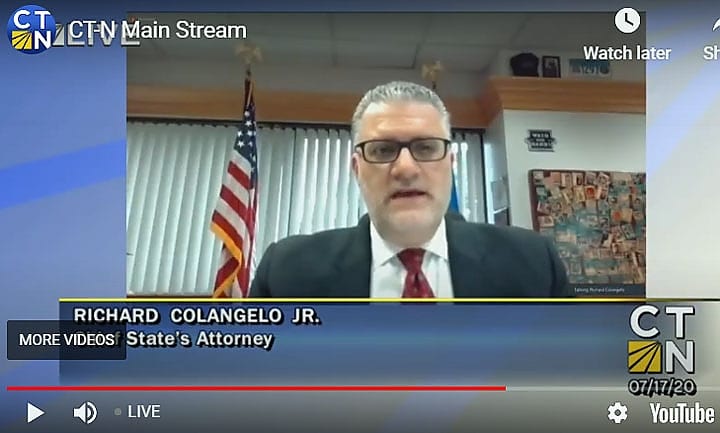Law Enforcement Pitches Changes; Black Community Testifies About Misconduct

Audio By Carbonatix

Sen. Gary Winfield, co-chairs the Judiciary Committee. CT-N image courtesy of CTNewsJunkie.com
A police accountability bill is on the agenda for the special legislative session expected to begin this coming week, and among the changes the bill would make to policing is the removal of officers’ qualified immunity from financial responsibility.
By Lisa Backus, CTNewsJunkie.com
Law enforcement officials who testified Friday at a public hearing on a police accountability bill offered a number of suggested changes to the proposal. The Black community testified in support of the legislation and shared stories of police misconduct that they’ve experienced.
Chief State’s Attorney Richard Colangelo recommended spending $1.9 million to create an independent unit to investigate deadly police use of force incidents.
Former Executive Director of the Connecticut State Police Union Andrew Matthews suggested that police will quit or retire in droves if the legislature removes qualified immunity which protects officers from being personally financially responsible for constitutional rights violations.
Colleen Lord tearfully asked that correction officers be included in the proposed bill after her teenage son died 15 months ago while in state Department of Correction custody in the New Haven detention center.
Members of the Judiciary Committee spent hours Friday listening to often emotional testimony on the bill which, if passed, will reshape the way policing is done in the state.
The proposed legislation calls for an independent body under the Division of Criminal Justice to investigate deadly police use of force incidents, requires officers to undergo regular mental health and drug screening and gives the state’s Police Standards and Training Council the power to “decertify” police officers who have committed wrong doing.
Not everyone is on board with the changes. Many white residents spoke against the bill while Black residents told stories of egregious police behavior including one woman who said the white female driver who struck her brother with a car was never charged even though she had an unregistered vehicle and her license was expired.
State Rep. Toni Walker, D-New Haven, later said that she had been pulled over in her own district and questioned on where she got her car.
But many speakers agreed that “rogue” officers or “bad apples” should be held accountable.
More than 150 people, including police officers, advocates for police accountability, and state residents signed up to speak during the hearing on the bill which was expected to last 12 hours. As of 1 p.m. the Judiciary Committee had received 341 written testimonies. The bill is one of four issues expected to be taken up during a special legislative session slated to start next week.
State Sen. Gary Winfield, D-New Haven, chair of the Judiciary Committee which hosted the public listening session, began discussions on drafting the bill after state residents began protesting the death of George Floyd who was killed during an encounter with Minneapolis police on May 25.
Winfield has repeatedly called the proposed legislation an opportunity for change during a moment of time. “Part of the cost that we are talking about is the cost of human lives,” Winfield said.
People need to stop talking about the death of Floyd and start focusing on 401 years of “terrorism” sanctioned by the government when they discuss police accountability, said Barbara Fair, a longtime activist with Stop Solitary CT.
“I’m looking for real transformative change in the way we are policing in this country,” Fair said. She went on to say that she has been an activist for 30 years but has yet to see legislative change happen as swiftly as it did when two men killed three members of the Petit family in Cheshire in 2007.
“Police and the Department of Correction will fight against any type of transformative change,” Fair said.
The Division of Criminal Justice, headed by Colangelo, is overall in support of the bill, he said during testimony. But Colangelo recommended some changes including adding a third Deputy Chief State’s Attorney to act as the “inspector general” outlined in the bill to investigate the use of force incidents.

Chief State’s Attorney Richard Colangelo. CT-N image courtesy of CTNewsJunkie.com
Colangelo recommended also hiring a chief inspector, six other inspectors, a paralegal, and a crime scene specialist at a cost of $1.9 million. “This is the minimum staffing needed based on prior cases,” Colangelo said.
The unit would also need subpoena power and Colangelo recommended allowing the inspector general to investigate policy violations that may have occurred during the entire police interaction in a use of force incident. Policy violations are currently investigated by individual police departments with a state’s attorney investigating deadly use of force.
Matthews claimed during his testimony that scores of officers would leave if the legislation passed with the provision to nullify qualified immunity, a legal concept that protects officers from being financially responsible for their actions in federal civil rights cases.
“No police officer would risk their life out of fear of being sued,” Matthews said. The results could be catastrophic for officers and victims if police hesitate when showing up at a scene, he said.
“A third party could be injured or killed,” Matthews said. He also objected to the release of internal affairs investigations if the allegations are determined to be “unfounded” by the police department and wanted the portions of the proposed law that would allow POST to decertify officers for wrongdoing.
“They should be guaranteed full due process rights,” Matthews said.
The bill has the support of Waterbury Mayor Neil O’Leary, a Democrat, who is a former city police officer and police chief. But even O’Leary had qualms about the section on qualified immunity.
“Most of the bill gives us the necessary tools to hold rogue officers accountable,” O’Leary said. “It also raises standards for police chiefs and supervisors. The only issue I’m worried about is qualified immunity.”
Under the legal doctrine of qualified immunity, officers can not personally be held financially responsible for federal civil rights violations unless they have acted outside the scope of their duties, according to a June 25 report on the topic from the Congressional Research Service.
O’Leary said he’s spoken to attorneys since the proposed bill was announced last week, but he was still unsure what impact it would have on municipalities. “There is so much confusion about what is qualified immunity,” O’Leary said. “But I absolutely feel as a police officer, police chief and elected official that the majority of this bill gives all of us the ability to hold rogue officers accountable.”
Republished with permission from CTNewsJunkie.com, all rights reserved.
Like what you see here? Click here to subscribe to We-Ha’s newsletter so you’ll always be in the know about what’s happening in West Hartford! Click the blue button below to become a supporter of We-Ha.com and our efforts to continue producing quality journalism.



